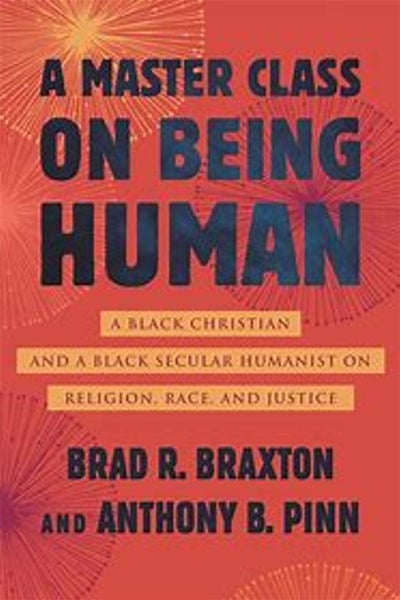Reviewed by Rochelle Herbst Willingham, Department of Religion

The form and premise of A Master Class on Being Human: A Black Christian and a Black Secular Humanist on Religion, Race, and Justice —a dialogue between a black Christian and a black secular humanist—warrant a discussion on its origins. The authors Brad R. Braxton and Anthony B. Pinn were invited to speak at Teddy Reeves’s “gOD-Talk” in Dallas, Texas in January of 2020. While both Braxton and Pinn had been part of the same discipline—African-American Studies—this event was the first time they had a chance to talk with one another. They decided to continue the conversation, but as so many experienced when COVID-19 hit, those plans were disrupted. They decided to continue the conversation via email, setting ground rules to maintain the spontaneity and free-flow of conversation as much as possible. The result is a book which resembles the format of bell hooks and Cornel West’s Breaking Bread.
This book is structured around seven prompts, which feature questions surrounding issues of religion, race, and social justice (e.g., What is religion, and does it help or harm? What do we learn from Black Lives Matter? Does [or should] religion have a public role?) These initial questions serve as the launching point of conversation between Brad Braxton (a black Christian) and Anthony Pinn (a black secular humanist).
In the first chapter, the authors discuss their definitions of religion, which reveal their differing theoretical orientations. Braxton, an ordained minister, defines religion as a kind of cultural product. His definition encompasses practices and beliefs, with a consideration of community. For Pinn, on the other hand, religion is a hermeneutic or interpretive device (theorized more fully in his recent monograph, Interplay of Things). While Braxton advances a more sociological definition of religion, Pinn takes a more philosophical approach, developing a new language for theorizing religion.

One of the central concerns of this book is antiblack racism and black death, as seen for example in the deaths of Breonna Taylor and so many others at the hands of law enforcement. The authors share the same opinion that change is needed; however, they differ in their orientation toward the future. Braxton, influenced by his training in biblical studies and homiletics, is future-oriented: hope is “a portrait of a reimagined world that energizes us to make that world a reality” (128). He views this as a partnership with a “transcendent spiritual energy” (i.e., God) which enables people “to imagine greater possibilities in the future” (128). By contrast, Pinn speaks in terms of persistence, which involves a struggle against present circumstances without an orientation toward a future outcome. He invokes the “absurd heroes” of Camus, including Sisyphus, who labors with no end in sight. During an interview as part of the Boniuk Institute Reading Religion salon, Pinn said that humanity is found in the struggle.
Of especial relevance to black religious studies is the discussion concerning black “nones”—those who claim no religious affiliation. Black religious studies has in the past assumed Christianity as the normative religious position. Both authors push back against this assumption. They discuss what “nones” have to offer, including a focus on social justice, in part due to their lack of concern for an afterlife. “Nones” also demonstrate new possibilities towards collective life outside of churches. For example, Braxton describes people meeting for Sunday brunch and how people have told him that they have found more “spiritual nourishment” from such gatherings than at church sermons (48). “Nones” are also discussed in the chapter on Black Lives Matter (BLM). The authors discuss similarities between BLM and the earlier civil rights movement. Both movements address the same concerns and do so in the public sphere; however, they differ in their power structures. This book is intended for both general and academic audiences, and the authors use a conversational style and avoid jargon.
In addition to expanding the scope and possibilities within black religious studies, this book is invaluable to readers of all backgrounds. The authors provide a model for how to have dialogue with people from different religious and theoretical backgrounds. The one limitation is that trust is required before such dialogue can occur. In the epilogue, the authors reflect upon the writing process at the height of the pandemic and how it taught them the importance of nonverbal communication. Lacking such cues, they had to assume that the other person was responding charitably. In the current, polarized environment, it is unfortunate that this model of dialogue cannot easily be translated to the digital sphere of social media. However, this book is still an invaluable “master class” on fostering dialogue with others, embracing differences, and opening oneself to learning. And with the authors’ actions towards bringing people from different backgrounds together in dialogue, they are in practice bringing about the conditions to make this possible.
(Braxton, Brad R. and Anthony B. Pinn. 2023. A Master Class on Being Human: A Black Christian and A Black Secular Humanist on Religion, Race, and Justice. Boston, MA: Beacon Press)

